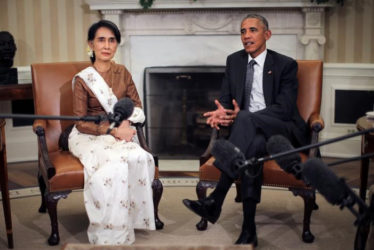WASHINGTON, (Reuters) – Myanmar’s Aung San Suu Kyi called yesterday for the lifting of economic sanctions against her country, and President Barack Obama, in their first White House meeting since she became leader, said the United States was ready to do so.
“It is the right thing to do in order to ensure that the people of Burma see rewards from a new way of doing business and a new government,” Obama said with Suu Kyi beside him in the Oval Office.
The trip by Suu Kyi, 71, who like Obama is a Nobel Peace Prize laureate, capped a decades-long journey from political prisoner to national leader after her party won a sweeping electoral victory last year.

With Suu Kyi no longer an opposition figure, Washington has been weighing a further easing of sanctions against Myanmar, formerly known as Burma, as Obama looks to normalize relations with a country shunned when it was ruled by a military junta.
“We think that the time has now come to remove all the sanctions that hurt us economically,” Suu Kyi said, noting that the U.S. Congress had supported her country by backing sanctions in the past to apply pressure for democratic reforms.
As Suu Kyi arrived for the meeting, the White House issued a statement saying it would reinstate Myanmar to the Generalized System of Preferences, or GSP, which provides duty-free treatment for goods from poor and developing countries.
Myanmar was removed from GSP benefits in 1989 following pro-democracy uprisings a year earlier that were brutally suppressed by the ruling military junta. Myanmar will be back in the program on Nov. 13, U.S. officials said.
Reinstating those benefits, combined with lifting sanctions, “will give the United States, our businesses, our non-profit institutions greater incentive to invest and participate in what we hope will be an increasingly democratic and prosperous partner for us in the region,” Obama said.
After visiting the White House, Suu Kyi met with some members of the House of Representatives at the U.S. Capitol.
She was to return there today for meetings with House and Senate leaders from both parties, although not Paul Ryan, the Republican House speaker. Ryan’s aides said he had a scheduling conflict.
Some members of Congress have expressed concerns about change in Myanmar and its human rights record. They have introduced at least two pieces of legislation seeking to give lawmakers some influence on the process of easing sanctions.
Republican U.S. Representative Ed Royce, chairman of the House Foreign Affairs Committee, commented after meeting with Suu Kyi that while the new administration brought hope to Myanmar, he remained committed to efforts to protect its oppressed Rohingya Muslim minority.
For Obama to lift sanctions, he would need to issue an executive order ending the national emergency declaration on Myanmar, first issued in 1997, which underpins sanctions, and revoke previous country-related sanction orders.
A senior administration official said the removal of sanctions would not apply to military-to-military assistance.
In a statement on Myanmar, the State Department said that several restrictions would remain in place, including barring visas for military leaders.
The United States eased some sanctions against Myanmar this year to support political reform but maintained most restrictions with an eye toward penalizing those it views as hampering the democratically elected government.
The sanctions announcement drew swift condemnation from rights groups, which said it forfeited leverage on Myanmar’s military.
“Lifting restrictions on doing business with Burma’s military and its corporate enterprises, as well as the friends and cronies who been enriched by their decades of rule, is not the right thing to do,” said John Sifton, deputy Washington director at Human Rights Watch.
“It benefits largely them, and few others, and certainly not the people of Burma in general.”
Suu Kyi has been criticized for doing too little to address the plight of the Rohingya, some 125,000 of whom have been housed in temporary camps since violence in 2012.
Myanmar law does not recognize the Rohingya as one of the country’s 135 official ethnic groups, making them stateless. Seen as illegal immigrants from neighboring Bangladesh, they are deeply disliked by many in Myanmar.
“We want to make sure that everybody who is entitled to citizenship is accorded citizenship as quickly and as fairly as possible,” Suu Kyi said.
Senator Bob Corker, chairman of the U.S. Senate Foreign Relations Committee, criticized what he described as Suu Kyi’s “dismissive” reaction to concerns he had raised about her country’s record on human trafficking.
“I plan to pay very close attention to her government’s efforts to prevent innocent human beings from being trafficked and sold into forced labor and sex slavery,” the Republican said in a statement after a breakfast meeting with Suu Kyi and Vice President Joe Biden.




